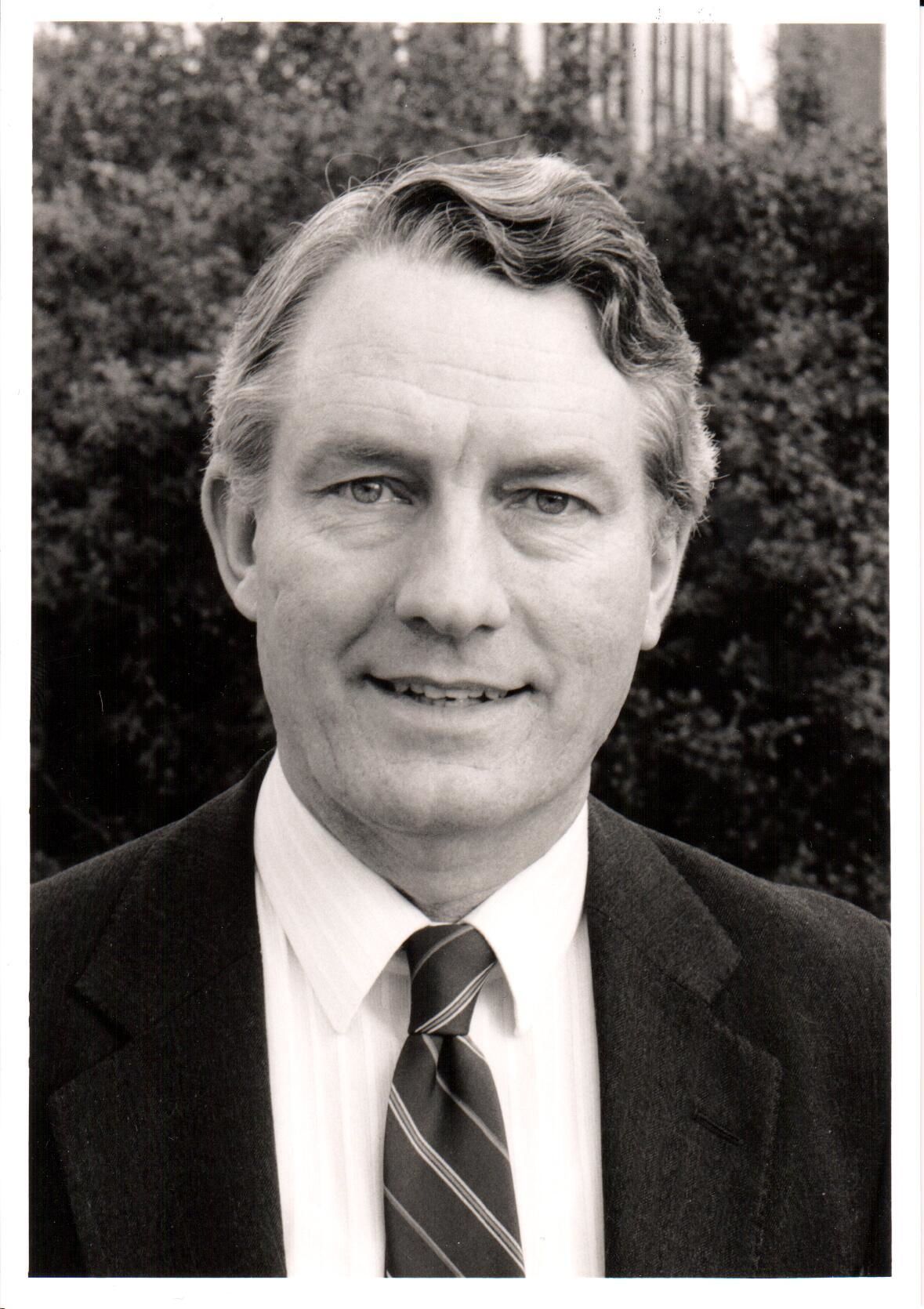In memory of Sir David Harrison CBE
1930-2023

The Department is saddened by the death of Sir David Harrison on March 27th, 2023 at the age of 92. Our deepest sympathy goes to Lady Harrison and family. David was a great friend of the Department over a very long period. For 23 years he was a Lecturer in the Department, but left in 1979 to become vice-Chancellor at Keele (1979-84). His time after his initial period in Cambridge was followed by a distinguished career in higher education, including roles as vice-Chancellor at Exeter University (1984-94), Chairman of the Committee of vice-Chancellors and Principals (1991-93), President of the Institution of Chemical Engineers (1991-92) and Master of Selwyn College (1994-2000).
His schooling was at Bede School, Sunderland and Clacton County School. In those days military service intervened, and he became a 2nd Lieutenant in the Royal Electrical and Mechanical Engineers. Subsequently, at Selwyn (which then was only for Anglicans, before Selwyn became a full College of the University), he read Natural Sciences, taking Part 2 in Chemistry. He then did a Ph.D. at the local Department of Physical Chemistry, supervised by E.A. Moelwyn-Hughes (a talented Welsh preacher, who wrote beautiful English), working on the heat capacities of liquids. Straight after that in 1956 David became a University Assistant Lecturer in Chemical Engineering and was promoted to a full Lecturer in 1961. Under Fox as Head of Department, it was an achievement to be awarded such a promotion, considering how other, subsequently distinguished, people were shown the door at that stage in their careers. In 1957 he was elected a Fellow of Selwyn. Important early dates were 1963, when the book “Fluidised Particles”, co-authored with John Davidson, appeared, and 1967, when he became Senior Tutor of Selwyn. Taking on a Senior Tutorship never left anyone much time to pursue research, but David worked hard enough to more than cope. He was always cheerful and smiling, with a very positive attitude to life and a ready, apposite quip. He was interested in people and the Institutions, which they frequented.
His work on fluidisation is sometimes assumed to have been a collaboration with John Davidson, as the senior partner. That is not totally accurate, as can be seen from David's many publications without J.F.D. as a co-author. For example, there was his independent work on entrainment, the fluidisation of fine particles, mass transfer from a slug, the effects of elevated pressures, and events at a multi-orifice distributor. Their joint work was helped by new links (initiated by Danckwerts) with the National Coal Board (NCB), which became interested around 1967 in burning coal in a fluidised bed to generate electricity. David started making photographic measurements of the temperature of a coal char particle, when burning in a hot bed of sand fluidised by air. Of course, their joint book was a big step in understanding and promulgating fluidisation; both men made conspicuous contributions. The book provided them with a plan of how their studies would develop. Another book “Fluidisation” appeared in 1971, with a revised edition (with J.F.D. and R. Clift) in 1985. A large review (J.F. Davidson, D. Harrison, R.C. Darton, R.D. La Nauze, The two-phase theory of fluidization and its application to chemical reactors, in “Chemical Reactor Theory, a Review”, Eds, L. Lapidus, N.R. Amundson, 1977, 102 pp, Prentice-Hall) brought many strands together.
David served as Senior Tutor at Selwyn between 1967 and 1979. Students of the College recall his warm and friendly words for all occasions and his quiet, efficient and urbane manner. The late 1960s and early 1970s witnessed a period of serious student unrest, about international concerns over the war in Vietnam, Greek Colonels and the Apartheid regime in South Africa, as well as demands for reform of the examinations and paternalism in Cambridge. David was amongst those who steered Selwyn and the University carefully through those troubled times. He also oversaw the change at Selwyn from an all-male College, when women were admitted in 1976. This brought with it many challenges, which he and his wife Sheila carefully negotiated with aplomb and care - so much so that, by 1977 when one of us (JSD) arrived as an undergraduate, no sign of this momentous change in the diversity of the student population was apparent. One immediate strategic effect, of course, was that academic achievement improved, because of the wider pool of applicants, thus starting a process of increasing academic achievement, which has continued to this day. His periodic invitations to students for drinks at his home and the very warm welcome extended to students by David and Sheila are recalled fondly by many. Students were also impressed by his connections with the royal family: the college hosted separate visits by Princess Margaret and Prince Philip, then the Chancellor of the University. Much later, of course, David returned to Selwyn as Master (1994 – 2000), when he served the University, as Deputy vice-Chancellor (1995 – 2000) and Pro vice-Chancellor (1997). He continued to be a valued and important member of Selwyn up to the end of his life. In fact, he had been associated with Selwyn for over half the time the College has been in existence.
As if all this were not enough, David took on many other obligations. Thus, in his second period in Cambridge he served on the Council of the Senate, as deputy vice-Chancellor, Chairman of the Chemical Engineering Syndicate and also of the Faculty Boards of Engineering and Education. In the wider world, he was chairman of the Advisory Committee on Safety in Nuclear Installations, a member of the Engineering Council and an Hon. Editor of Trans. I. Chem.E. He was on the councils of at least six secondary schools. At Homerton College he chaired the Board of Trustees for 31 years, when the teachers’ training college was becoming a very proper Cambridge college – the second seen by David to gain full Collegiate status in Cambridge. Inevitably. he was a member of various ecclesiastical bodies, such as Ely Cathedral Council and the Royal School of Church Music. He was vice-President, and subsequently President of the I.Chem.E., as well as Director of the Salters’ Institute of Industrial Chemistry and a member of the Board of Management of the Northcott Theatre in Exeter. His honours included CBE, FREng. and honorary degrees from Keele, York and Exeter. Throughout all this he was supported cheerfully and stylishly by Sheila. They worked together extremely well.
ANH, JSD
Further tributes from our alumni
“I first met Sir David after joining Cambridge as a UTO in 1998; he was at that time Chair of the Syndicate overseeing the Department, and also the Master of Selwyn College. As a luminary of our discipline – with significant intellectual contributions – I was grateful to have had the opportunity to work with Sir David while I was a member of the Department and a Fellow of Selwyn College. Sir David was a leader, a gentleman and a scholar. He will be fondly remembered by many including myself.”
Anton Middelberg (Prof)
BE, MA, PhD, FIChemE(UK), FIEAust, FTSE(Aus), FNAI(US)
Executive Editor, Chemical Engineering Science
"David Harrison was lecturing in the early days of the Tennis Court Rd, Chemical Engineering Department. The course at that time was heavily theoretical under the leadership of Professor Fox supported by the other pioneers of the subject, Danckwerts and Davidson. I found the course difficult. One of the bright spots was Harrison’s lectures on fluid mechanics, which I could actually understand! He helped make the rest of the course digestible for me."
Professor W.M.Steen Hon FIMechE
"I recall Professor Harrison as being a great combination of erudition, willingness to listen and personal charm; truly a man for all seasons."
Steve Williams (Chemical Engineering Department alumnus 1958-1960)
"What a great man! He was my supervisor back in 1974-1976. He was gentle, kind, knowledgeable, and so willing to share his passion for chemical engineering. He was the President of IChemE and in that capacity he visited Australia. I was honoured to host a reception at my home in Melbourne to mark his visit. Another alumnus, and good friend, (Ken Beadle) was there, and he was also supervised by Sir David. It was a great night of celebration of chemical engineering. He is treasured by all those whom he taught, and we owe him (and the Dept) a debt of gratitude. I’ve had a lifetime in chemical engineering, and Sir David was in large part responsible for my own legacy. RIP, Sir David, you are our hero."
Graham Hill (grad. 1976), President at HillConsult Asia-Pacific
If you would like to share a tribute to Sir David, or pass on condolences to his family, please contact Elena Gonzalez, eg314@cam.ac.uk
